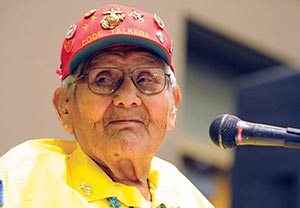Code talker Nez inspires students
By Noel Lyn Smith
Navajo Times
ALBUQUERQUE, Nov. 17, 2011

(Special to the Times - Donovan Quintero)
Navajo Code Talker Chester Nez, the last of the "Original 29," talked about his book "Code Talker" on Tuesday.
Brown, from Mariano Lake, N.M., wanted to know Nez's opinion about the Navajo language being taught in colleges and universities.
"I am currently minoring in Navajo language and the code talkers are a big inspiration and my motivation for going to do that," Brown said.
Nez thought about the question, then replied that learning the language is important and he should know.
In 1942, the Marine Corps recruited the first 29 Navajo Code Talkers and Nez, now 90, is the only surviving member of the group.
Nez's life story and military service is subject of a new book, "Code Talker," that he wrote with Judith Schiess Avila, a code talker scholar who conducted 80 hours of interviews with Nez and his son Michael.
The 320-page book was released in September and includes rare photographs of the code talkers along with the final form of the Navajo Code Talkers' dictionary.
On Tuesday night, Nez and Avila spoke at the UNM student union about the book before a large crowd. The event started with Avila talking about the code and about Nez's early life in Chichiltah, N.M., before he joined the Marines in April 1942.
At the time the Navajo code was developed, she said, the language had no written form so no one could learn it by studying a language dictionary.
This served as an advantage to men like Nez because, "memorization came naturally to these young men," she said.
At first there was skepticism among some superior officers about the new code until a commanding officer challenged a group of Navajo Code Talkers to transmit code against another group that was trained in deciphering the code that the Marines were using at that time.
Two minutes and 30 seconds later the Navajo Code Talkers had correctly deciphered the code.
"The code was fast, the code was accurate and although they didn't know it then, the code was unbreakable," Avila said.
After Avila's introduction Tuesday, it was Nez's turn to speak.
"Is this on? Hello? Hello? Can you hear me?" Nez said to the audience.
Shouts of "Yá'at'eeh" rose from the audience and echoed through the ballroom.
Nez listed some of the battles where he served - Guadalcanal in November 1942, Bougainville in November 1943, Guam in July 1944 and Peleliu in December 1944.
"I am very, very happy to come out alive," he said. "It is a very sorry thing when you see somebody you went to boot camp with or your friend lying on the beach."
Nez addressed the audience for about seven minutes before participating in a question-and-answer session with Avila.
Within those seven minutes the audience hung on every word that he spoke.
Throughout the years, he said, he thought about the families who lost loved ones during the war and he feels fortunate to meet some of those families.
He said that after the war, he saw the images of dead friends and fallen comrades and remembered the sounds of night raids conducted by the Japanese.
These images stayed with him until his father, D'ent Nez, had a medicine man perform a ceremony to ease those memories.
"I wish and I pray that they would not have another one - a war," he said. "It's a terrible thing to see, it's not a happy thing."
At the end of Nez's presentation the audience gave him a standing ovation.
Darnell Daniels, a UNM student from Fort Defiance, was the first person to speak to Avila and Nez during the question-and-answer session.
"I have had the opportunity to meet Barack Obama and I can honestly say this is one notch up," Daniels said.
One audience member asked Nez if he ever told his father about his service.
Avila explained that the code talkers were silent about their service until the code was declassified in 1968, 23 years after the end of World War II.
"My father was very surprised to learn that we used our Navajo language to develop a code," Nez said. "He was so proud and so happy."
Nez even taught his father a few phrases from the code.
"I think it was wonderful thing for him to learn how we used the code," Nez said.
Nez was also asked if he ever wanted to return to the Pacific islands.
"It's something that bothers you. It is something like a nightmare. This is one reason why I will never go back and see," Nez said.
A woman in the audience asked Avila why she decided to write the book with Nez.
"I decided the first day that I met Chester that his life was fascinating and his story needed to be told," Avila said.
But, she said, she had to convince Nez to tell his story.
"Chester was the one I was lucky enough to meet," Avila said.

